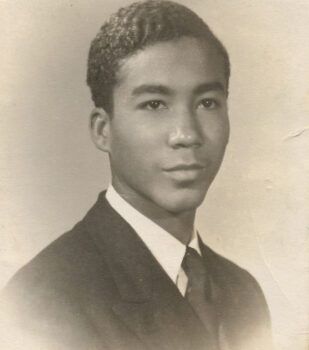New Writing Scholarship Continues Pulitzer Prize-Winner’s Legacy

In a world of nearly eight billion unique voices, finding one’s own isn’t easy. Texas A&M University is where the late Charles Gordone, the first African American to win a Pulitzer Prize in drama and a former faculty member in the Department of English, found his — and where he helped students find theirs.
“Charles loved Texas A&M; it was truly where he kind of just found a home and where he was fully embraced,” his granddaughter, Denica Gordon-Mandel, said. “He wanted to do the same with his students — to give all of their voices a place to be heard within his class.”
To help continue Gordone’s legacy, Gordon-Mandel established the Charles Gordone Foundation Excellence Award Writers Award for American Voices. The scholarship was created through the Texas A&M Foundation under their Foundation Excellence Award (FEA) program, which is designed to support outstanding students from underrepresented groups, including students from economically and educationally disadvantaged backgrounds.
“Every culture comes to the table with their own experiences,” Gordon-Mandel said. “I always loved how my grandfather came from a holistic approach. What is your voice? Tell me about you, because all of our experiences make up who you are. You should celebrate it, or at least be able to express it.”

Coming To Aggieland
The temperature in College Station hovered around a cool 40 degrees when Gordon-Mandel arrived last November 10; however, the reception she received was nothing less than warm.
“I got to tour campus with the Maroon Coats and got to see what you guys are doing with the new College of Arts and Sciences and was so inspired,” Gordon-Mandel said. “I live in Los Angeles and I’m not used to people being that nice. It was just a lovely experience, and after that visit, I decided to make the pledge to give.”
Gordon-Mandel said she was perhaps most struck by Texas A&M’s palpable sense of tradition and unity conveyed through the Bonfire memorial, Muster and Silver Taps.
“You are definitely a community,” she said. “The memory of all of the individuals who were carrying on and the sense of unity was so very powerful. For Aggies, it’s about creating rituals of coming together. Everything you all do is so intentional to cultivate community, and that really spoke to me.”
It’s safe to say that her grandfather was similarly taken with Aggieland. He began teaching English and speech communications in 1987 and was known for being an active educator, starring in and guiding student-led plays.
“Charles liked to get his students to understand their own history; to understand their ‘whys’,” Gordon-Mandel said. “And it doesn’t have to be pretty. But that’s how he pulled so many people in — by giving them the opportunity to go deeper, which is very freeing. He was able to get the kids to sit down with themselves and just be.”
No Place To Be Somebody
Born in Cleveland in 1925, Gordone pursued his passions in both theater and education. He received a bachelor’s degree in drama from the University of California at Los Angeles and later moved to New York City in search of acting opportunities, including starring alongside up-and-coming artists like Maya Angelou. In 1970, he wrote his Pulitzer Prize-winning play, “No Place to be Somebody,” which focused on characters of different backgrounds and ethnicities who struggle with living in a white-dominated society while also depicting how the characters are influenced by other races and prejudices.
“He grew up in a time where it was very hard to be a multicultural human,” Gordon-Mandel said. “There were all these questions: ‘Who am I?’ ‘Where do I belong?’ ‘What does it mean to be Black?’ So those questions took a lot of roles in his early work…it was about him finding a place where he could be somebody.”

A Family Legacy
“Everybody in my family writes,” Gordon-Mandel said. “My grandmother wrote poetry, my son is an award-winning poet and my daughter has a nonprofit organization that stands against prejudice, and she’s always writing powerful statements that inspire people to become activists.”
Alexander Murray Palmer Haley, the author of “Roots: The Saga of an American Family” that was adapted into a 1977 miniseries, is also a branch on her family tree.
“Writing is so powerful,” Gordon-Mandel said. “I really lean into the idea that we should all write down our stories and just sit with our thoughts.”
Gordon-Mandel uses writing at her private practice, Cognitive Behavior Health Partners, in much the same way her grandfather did: to help people find and express their voices.
“One of the things I do a lot in my work is journaling,” she said. “We spend so much time thinking about things, and we don’t put them down on paper, and we’re just sitting in it, and we don’t know the root causes of what’s in our minds now.”
She believes that this scholarship, along with the power of writing, will continue her grandfather’s legacy.
“I think his legacy is about embracing everyone,” Gordon-Mandel said. “It’s the ability to explore who you are and not let social conditioning or norms or pressure define your identity. Charles’ legacy is to let people explore and express themselves through the written word.”
To learn more about FEA scholarships or supporting deserving students in the College of Arts and Sciences, contact the Development Team.
Media contact: Shana Hutchins, shutchins@tamu.edu





